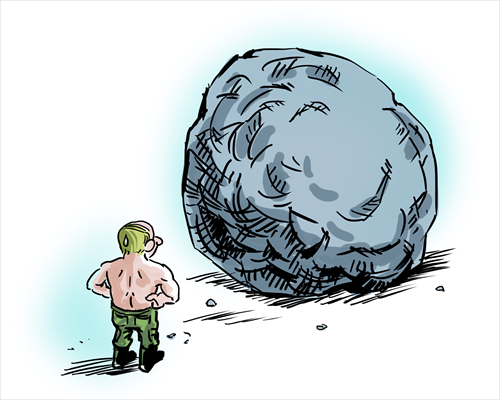Putin’s biggest challenge is public support

Illustration: Liu Rui/GT
This year is going to be very challenging for Russia. The country has entered recession, with GDP probably contracting by 5 percent or more, inflation soaring to 15-20 percent, unemployment climbing to 7 percent, and the ruble losing over half of its value against the major currencies.
Western sanctions, the plummeting oil prices and the structural problems of the Russian economy are to blame. Russians have seen it before, in 1998 and again in 2008-09, but this time the crisis is likely to last longer, and exiting from it will be harder.
What does the worsening economic situation suggest for the politics of Russia?
The existing political regime in Russia is based on a social contract between President Vladimir Putin's Kremlin and the bulk of the Russian people. Since Putin first came to power on New Year's Eve, 2000, the real disposable incomes of Russians have never stopped growing, even during the global financial crisis, at times at 10 percent per annum. In return for this, Russian voters have elected Putin to the presidency three times, and his protégé Dmitry Medvedev once.
They also gave the Kremlin full control of the federal and regional parliaments, governors and mayors. Opposition to this system was usually vocal, occasionally visible in the streets, but essentially impotent, lacking broad popular support.
Now the fat years are definitely over for Russia, and lean years lie ahead. If people continue to stick with Putin, it must be for other reasons.
One such reason is patriotism. By "bringing Crimea back home," Putin not only received enormous support, but altered the political landscape of the country. Putin did not recreate Russian patriotism and nationalism, but he reinstated it as the supreme national value and turned himself into its leader. "I am the biggest nationalist in Russia," he proudly proclaimed at a press conference last year.
Another reason is the sanctions. Russians see Western sanctions against their country as a form of warfare, which brings back their hallowed traditions of national resistance. Putin is no longer merely president; he is commander-in-chief defending Russia against the most powerful country of the day and its allies.
Whatever their offensive capabilities, Russians are historically best in defense of their motherland. Whatever their doubts or reservations about their national leaders, they rally around them, for the duration of the struggle. In exchange, they expect their leaders to stand firm, be resolute, and take them to victory.
Russia is essentially invincible when facing a foreign adversary. But the same people who successfully defended their country against Napoleon and Hitler, and eventually defeated and destroyed them, brought down their own country twice within a single century: in 1917 and again in 1991.
Russia is vulnerable inside. Putin knows it. He carefully analyzed his predecessors, Nicholas II, the last tsar, and Mikhail Gorbachev, the last Soviet leader, and has built elaborate defenses against a new revolution in Russia. Putin's main recipe for staying in power is to stay in close touch with the bulk of the people, and anticipate emerging trends.
Revolutions are not the only hazard for Russian leaders. Interestingly, at a recent meeting with journalists, Putin allowed a question about a "palace coup." "We do not have palaces here," he quipped, rather unconvincingly, "but only official residences."
Cabals of senior officials against the top leader, however, are not rare in Russian history. In 1964, Nikita Khrushchev was ousted by his colleagues. The end of the communist party rule was precipitated by the putsch against Gorbachev, led by his top aides. The technique of "color revolutions" necessarily includes, in the final stage, the betrayal of the head of the regime by his siloviki.
Russia has entered uncharted waters. If Putin's goal is mere survival of the regime, which is widely believed to include too many crooks, he will eventually lose.
During the years of national sacrifice, Russians may not tolerate something so crassly unjust. They may still like the tsar, but if he cannot rein in his boyars, he may be in trouble.
And wars here are usually a double-edged sword. Despite the official propaganda, the bulk of Russian peasants did not accept WWI, which broke out in 1914, as a truly patriotic effort, the middle classes saw the tsarist government as incompetent, and nearly all viewed the court camarilla as a disaster for the country. Less than three years later, the monarchy collapsed, and shortly thereafter the empire.
A hundred years ago, Russia was not doomed. It is anything but doomed today. To escape the analogy of a revolution, Putin must rise above the rapacious elite, and to avoid being overthrown, he must replace it. No easy task, but he will be judged by history by how he meets his biggest challenge.
The author is director of the Carnegie Moscow Center. opinion@globaltimes.com.cn